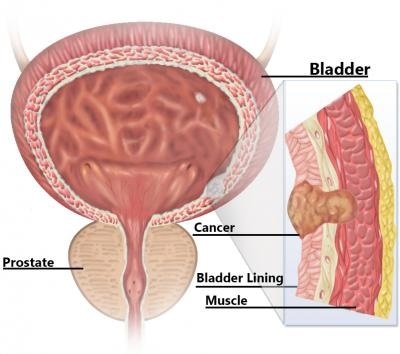Muscle invasive bladder cancer (MIBC) is a type of transitional cell carcinoma that originates from the urothelium and gradually invades the detrusor muscle of the urinary bladder.
What is MIBC?
MIBC is an advanced form of bladder cancer that is associated with a very poor prognosis. This type of cancer originates in the urothelial lining of the bladder and gradually spreads into the bladder wall muscle, perivesical fat layer, and adjacent organs. MIBC is correlated with the worst cancer-specific survival, with the percentage of living people 5 years after diagnosis less than 10%.

Bladder cancer is estimated to result in more than 15,000 deaths in the US in 2014. Muscle-invasive bladder cancer is the deadliest type of the disease. Image courtesy of Jonathan Bailey of the National Human Genome Research Institute
Signs and Symptoms of MIBC
At an early stage, bladder cancer may be asymptomatic. However, the most common clinical sign by which a diagnosis is generally made includes the presence of hematuria (i.e. blood present in the urine). This often occurs without any sensation of pain. In addition, frequent and painful urination can also be noticed in some rare cases. Another less frequent, but significant sign of bladder cancer is irritation in the urinary tract without any visible hematuria. This is very much similar to what occurs in some urinary tract infections. For this reason, diagnosis of bladder cancer often gets delayed, and disease progression to advanced stages occurs.
Diagnosis of MIBC
Once bladder cancer is suspected, clinical examinations that are generally followed to determine the degree and intensity of the disease include:
Urine cytology – is used to check for abnormal cells within the urine.
Blood tests – are done to get a comprehensive metabolic panel (CMP), including kidney and liver function tests.
X-ray, CT scan, or MRI – is done to get images of the affected area.
Cystoscopy – is performed by inserting a small tube with a camera and a light source through the urethra and into the bladder in order to see inside the bladder.
Retrograde Pyelogram – is a type of x-ray to check the bladder, ureter, and kidney.
Positron emission tomography (PET) scan – is usually used to check the extent of cancer spreading.
Transurethral resection of bladder tumor (TURBT) – is a very important technique to determine the type, stage, and grade of bladder cancer. This procedure is performed to see inside the bladder, take tumor sample, and resect the tumor from the bladder wall.
Treatment of MIBC
The golden standard for treating MIBC is radical cystectomy (RC) with extended pelvic lymph node dissection, with or without chemotherapy. In addition, external beam radiotherapy together with chemotherapy is also an effective alternative.
The following are the interventions that are generally considered to treat bladder cancer patients:
Radical cystectomy – this surgical procedure includes removal of the entire bladder, adjacent lymph nodes, and a part of the urethra. During surgery, the prostate can also be removed in men, and in women, the uterus, fallopian tube, ovaries, and vaginal wall can be removed.
Pelvic lymph node dissection – this procedure is used to check for lymph node metastasis.
Radiation therapy – it is a post-operative treatment strategy that is performed together with chemotherapy. It uses high-energy beams of radiation to destroy cancer cells. Common side-effects related to this therapy are nausea, vomiting and diarrhea.
Neoadjuvant chemotherapy – it is usually performed together with cystectomy. In chemotherapy, an anti-cancer drug or a combination of drugs is administered intravenously to kill cancer cells and reduce the size of the tumor, prior to surgery. This therapy comes with many side-effects, including reduced appetite, nausea, vomiting, hair loss, reduced blood cell count, infection, weakness and fatigue, and numbness in the hands and feet, among others.
Immunotherapy - Bacillus Calmette-Guerin (BCG), a bacteria of low pathogenic potential, is used for treating bladder cancer. A catheter is used to administer BCG directly into the bladder, which in turn activates the body’s immune system. Activated immune cells then attack and destroy cancer cells. Symptoms associated with this immune therapy include, but are not limited to fever, cold, and fatigue.
Targeted therapy – use of various targeted therapies against mutated genes are gaining importance to treat highly invasive bladder cancers, such as MIBC. For example, gene therapy vector mediated delivery of TP53 gene is used to treat bladder cancers in which TP53 gene is silenced due to mutation. Similarly, bladder cancers that overexpress growth factor receptors, such as EGFR or HER2, are treated with small molecule inhibitors of tyrosine kinase or monoclonal antibodies developed against the extracellular domain of the receptor.
Further Reading
Last Updated: Oct 23, 2018